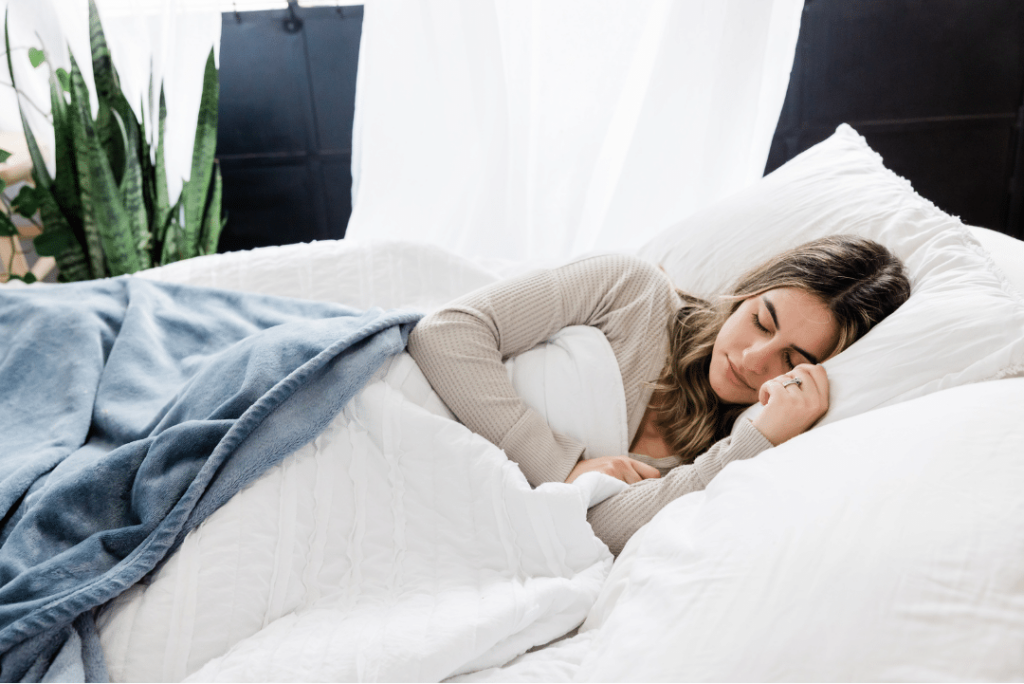
BLOG
Let’s face it: sleep as a parent is limited, regardless of how ‘good’ or ‘bad’ your kids sleep. Maximizing the amount of sleep – and more importantly, the quality – we’re getting as parents is crucial to being better equipped to handle interrupted sleep, and to be more intentional about the nighttime parenting choices we are making with our children. Though this is something we all know well, putting good sleep hygiene into practice is often easier said than done. When it comes to adult sleep, there are many small changes to be made that add up to a more restful night’s sleep. Here are 5 useful tips to help improve your own sleep.
We all strive for a good night’s sleep, but many don’t realize the importance of a healthy diet rich in sleep promoting foods and nutrients in order to achieve a more restful night’s sleep. Specifically, our diet needs to include sleep boosting foods that help to promote the production of serotonin and melatonin. Foods high in tryptophan, such as dairy, sea vegetables, and some proteins like turkey, help the body to metabolize this essential amino acid into serotonin, which is the precursor to melatonin.
Conversely, there are also anti-sleep foods such as caffeine, alcohol and spicy or high sugar foods, that if eaten too close to bed, can actually interfere with a good night’s sleep. Tracking which foods help and which ones hinder your sleep is a good way of helping to meal plan in a way that supports your individual sleep needs.
Though many of us find it relaxing to watch our favourite shows after the kids are in bed, the blue light that is emitted from screens and artificial lighting inhibits the body’s natural production of melatonin, the neurotransmitter that prepares our body for sleep. Limiting blue light exposure by dimming the lights, turning devices to night mode, and wearing blue light-blocking glasses will allow your body to adequately build up sufficient melatonin before sleep. I recommend reducing your blue light exposure for at least 60-90 minutes before you head to bed – and the same goes for kids, too!
Bedtime routines aren’t just for kids! Getting into a regular routine can help signal to your body that it is time for sleep. This includes not just the parts of your routine, but also the timing. Keeping the time you go to sleep consistent allows your natural circadian rhythm to prepare your body to fall asleep before getting overtired. Once you become overtired, you’ll experience a spike in cortisol levels, making it even more difficult to get to sleep and stay asleep.
This is true for kids as well, and may be one of the reasons your baby or toddler experiences false starts. Additionally, much like our children, adults benefit from a variety of sleep associations, too.
If you regularly have a hard time settling to sleep without your mind racing, practicing mindful meditation before bed can help to clear you of the stress, worry, and to-do lists of daily life. Using apps like BetterSleep or Calm are a great way to settle in with guided meditation.
Alternatively, you can test out a variety of self-guided breathing techniques to calm your nervous system. I personally recommend 4-7-8 breathing (inhale for a slow count of 4, hold for 7, and exhale for 8; then repeat 4 times), or left nostril breathing (intentional breathwork through your left nostril by blocking the right nostril, as the left side of the body is focused on calming, while the right side is focused on re-energizing).
If you find yourself still struggling to clear your mind, write it down! Keep a notebook or pad of paper on your bedside table, so that if you find yourself unable to clear your mind, you can put it on paper. Writing lists have been shown to reduce anxiety, boost productivity, and improve focus.
It probably won’t surprise you to learn that exercise can improve sleep, too. The high levels of exertion during a workout can increase your body’s need for sleep and improve sleep quality as well. A 2020 study found that HIIT workouts specifically resulted in longer sleep time, greater sleep efficiency, and less waking up in the night.
Moreover, if you work out at roughly the same time each day, your body’s internal clock (also called your “circadian rhythm”) will thank you. Syncing your workouts with your circadian rhythm can help you to further reap the benefits of the hard work you are putting in. If you’re getting back into exercise again as a new mom, try a postpartum workout class to ease back into exercise safely.
While all of these practices can have a help to improve your sleep, it’s important to remember that parenthood is an exhausting time that may leave you feeling out of control over your own needs. Sleep is a biological function that can’t be forced; rather, you can set all the conditions that allow sleep to overtake your body. This is equally true for our children’s sleep, and letting go and focusing on where you can control making changes will help to reduce anxiety around sleep deprivation. If you’re unsure of how best to make changes in your home, I offer a variety of support options to meet the needs of each unique family.
If you’re struggling to find sleep solutions to meet your family’s needs, please reach out! Book your free discovery call today.
